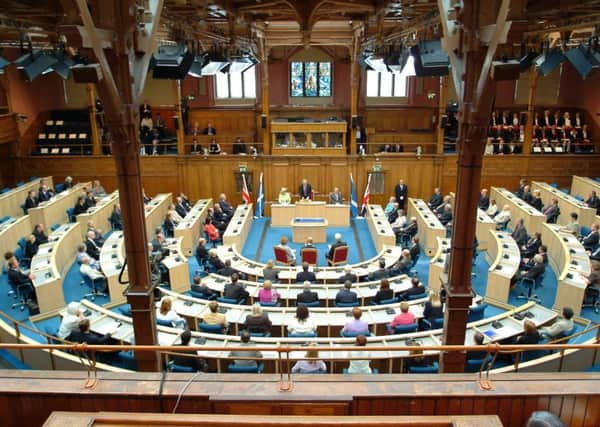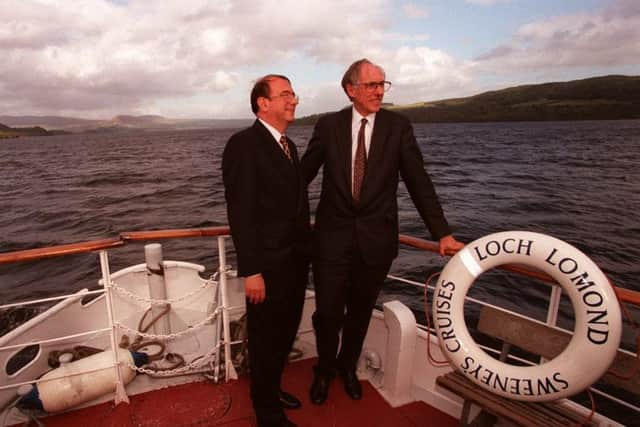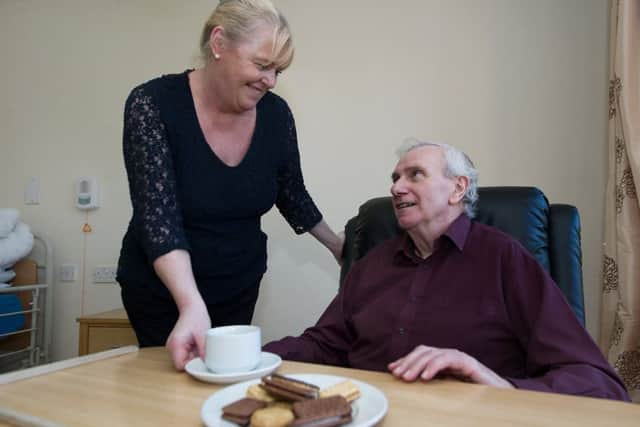Scottish Parliament at 20: How Holyrood found the power to make a difference


One way to reflect on the impact of the Scottish Parliament is to consider things that seem so natural today, but wouldn’t exist without it.
Before there was a parliament, first minister Donald Dewar promised that it would make national parks one of its priorities. In February 1999, the Labour leader travelled to the banks of Loch Lomond at Balmaha to declare that a government he led would protect land for the benefit and enjoyment of the whole nation.
Advertisement
Hide AdAdvertisement
Hide AdIt was a moment that only devolution could make possible. England and Wales got their first national parks 50 years earlier. Scottish campaigners had lobbied ministers in London for decades, but as the 20th century drew to a close, they joked darkly that the only countries in Europe without them were Scotland – and Albania.


The creation of the Scottish Parliament took the decision out of the hands of landowning interests in the House of Lords, and meant Dewar could be true to his word. In spite of delicate discussions with landowners and businesses, legislation allowing the creation of national parks at Loch Lomond and the Cairngorms was pushed through in Holyrood’s first year, and voted on just before the first summer recess, in July 2000.
“Scotland is the birthplace of John Muir, acknowledged as the founder of national parks in North America and, by extension, throughout the world,” environment secretary Sarah Boyack observed in opening the final stage debate in Holyrood. “Scotland has some of the finest landscapes in the world. It is high time that we had national parks.”
The National Parks (Scotland) Bill passed unanimously – and changed a nation’s relationship with its landscape. It isn’t often discussed as one of Holyrood’s big endeavours, but would Scotland be the same place without it?
Delving into official reports from the early years of the Scottish Parliament, it’s difficult to escape the sense of a pent-up energy being released. Many of the measures set down by those early bills are the ones now seen as defining of Scotland’s national character. That first parliamentary session also saw the introduction of free personal care for the elderly – built upon more recently through the introduction of Frank’s Law, legislation that began as a parliamentary petition and guarantees nursing care for those who need it before the age of 65.


Land reform was another issue that Dewar believed could only be resolved by a parliament in Edinburgh. “Who could imagine such a land reform bill passing unscathed through the massed ranks of the House of Lords?” he told one of the first debates on the Mound in 1999.
Who owns the land, and who gets to use it? These questions had shaped Scotland’s history, often painfully. That history was present in the chamber when MSPs gathered to debate the Scottish Parliament’s first land reform bill.
“It has taken us three centuries to get to this point,” the SNP’s Roseanna Cunningham reflected in the final debate on the bill. Labour minister Allan Wilson invoked the Land League movement and trespass campaigns that highlighted the lack of access to private estates. “It was the prospect of this day that kept so many of us going through the dark and often desperate 18 years of Tory government.”
Advertisement
Hide AdAdvertisement
Hide AdThe legislation put into law the universal right to access land for recreation, and Scotland’s unique protections for wild camping; the community right to buy, giving first refusal to residents when landowners move on; and most controversially from the point of view of landowning interests, a right to buy for crofters even when land isn’t up for sale.
Unsurprisingly, on the final day of debate, the bill aroused strong emotions. The Conservatives, the only party to vote against it, bridled against the weight of history.
“The debate and the bill have nothing to do with creating a more positive and contemporary Scotland—it is all about the wrongs and injustices of the past,” Tory MSP Bill Aitken told the chamber, before calling the Liberal Democrat rural affairs secretary, Ross Finnie, a “Mugabe in a tartan outfit”.
“The bill is, by any other name, expropriation of property… the bill is a land-grab of which Robert Mugabe would have been proud.”
Aitken later added that it was a “dark day for the Scottish Parliament”, claiming the legislation had “nothing to do with land reform and everything to do with the other parties in the parliament being obsessed with replaying the class wars of 200 years ago”.
That outburst brought the derision of other MSPs, with Wilson hailing “comrade Finnie, commander in chief of the Scottish land-grab unit”.
“Comparing mild-mannered, west Highland crofters with the thugs of Zanu PF, or ramblers with the North Korean people’s militia, does a disservice not only to the struggle for the liberation of the people of such countries, but to the Tory party,” said Wilson.
That didn’t stop one Scottish newspaper infamously splashing a picture of the Zimbabwean president across its front page, alongside a tribute to the Edinburgh government’s reforming zeal from a Mugabe spokesman: “It seems Zimbabwe and Scotland share the same goals and ambitions when it comes to land reform.”
Advertisement
Hide AdAdvertisement
Hide AdIn the debate, Cunningham had told the Tories to “quit while they are ahead”, warning that other countries had adopted far more radical measures that banned “hobby use” of land and foreign ownership.
But while the right to roam is immensely valued, and a small number of community (but not crofting) buyouts have taken place, the radical change one side hoped for and the other feared has yet to materialise.
“We very much hope that the bill results in a significant change in the pattern of land ownership in Scotland,” Cunningham had said. “I have expressed some concern that that will not happen.” It was one of the more measured contributions, and one of the more accurate.
In some areas, rather than correcting a perceived neglect by Westminster, the Scottish Parliament became a pioneer for the rest of the UK. There are a whole generation of drinkers alive today who won’t remember what the pubs and bars of Scotland were like before the smoking ban, and even those who are old enough might find their memories are dim. But anyone whose job it was to empty the ashtrays at the end of a Saturday double shift will have a perfect recall of how dramatically life changed from one day to the next when it took effect on 26 March, 2005.
By the start of its second session, the Scottish Parliament was well established and had legislated on weighty issues, but nothing reached into the lives of ordinary people like the smoking ban.
Holyrood was well aware of the magnitude of its decision. “Devolution means that we can no longer blame others for our national ills,” health secretary Andy Kerr told Holyrood, shortly before MSPs voted. “We have no excuse for abdicating our responsibility for tackling our poor health. Today, our country will lead the way in the UK and we will be at the forefront of change in Europe.”
Coalition ministers had been under pressure to take action for several years, particularly from the SNP, and it was the nationalist MSP Stewart Maxwell who sparked the process in earnest with a draft bill in 2003 for a ban in establishments that served food.
The government consultation that followed in 2004 produced a much tougher piece of legislation that had broad cross-party support. But looking back at the early debates on the smoking ban, it’s easy to find arguments and attitudes that seem alien today – although in 2012, when Holyrood came to legislate for another ground-breaking public health measure, minimum unit pricing, similar arguments were to be heard in the context of alcohol.
Advertisement
Hide AdAdvertisement
Hide AdThe bill appeared to be a particular problem for some in the Labour Party, who saw the ban as an attack on the poor. On the day after the Scottish Government launched its smoking ban consultation, John Reid – Tony Blair’s health secretary – told a public debate in London: “I just do not think the worst problem on our sink estates by any means is smoking, but it is an obsession of the learned middle class.
“What enjoyment does a 21-year-old single mother of three living in a council sink estate get? The only enjoyment sometimes they have is to have a cigarette.”
Reid wasn’t alone. Former smoker and future Scottish Labour leader Johann Lamont told MSPs that she “resisted the idea of banning smoking in public places because I thought of some of the people in local communities that I represent… the fact that they smoke is the least of their worries.”
Arguing for his bill when debate moved into the Holyrood chamber, Maxwell was interrupted by Labour MSP Duncan McNeil as he listed the health impacts on children from passive smoke.
“Is he seriously suggesting that we will have no diseases, no asthma and no children with ear ache when we ban smoking?” asked McNeil. He would later serve as convener of the Health Committee from 2011-16.
Many of the exchanges read now like the last stand between tobacco and the weight of medical evidence. “Does your product kill people?” was the blunt question to the representative from the Tobacco Manufacturers’ Association (TMA) from Lib Dem MSP Mike Rumbles at an early meeting of the Health Committee.
“Yes, through direct smoking,” the TMA’s Tim Lord replied.
Rumbles probed on – do non-smokers “have a right to breathe clean air? I would prefer a yes or no answer to that question.”
Lord responded: “I am not willing to give such an answer, because it is premised on whether breathing in other people’s smoke – in other words, passive smoking – is harmful or not.”
Advertisement
Hide AdAdvertisement
Hide AdThe smoking ban also became proxy for a debate around personal choice and freedom, with Simon Clarke from the smoking advocacy group, Forest, asking MSPs on the Health Committee “why should other people be discriminated against just because there are some people who wish to quit?”
It was an argument often cited by the Conservatives, the only party to vote against the ban. Maxwell was challenged by Tory MSP Murdo Fraser to “accept that there are already restaurant chains, such as Pizza Hut and others, that have introduced a voluntary ban on smoking? Is not that the way to go?”
The question was, Maxwell replied, who gets the choice. “Is Murdo Fraser really saying that, if a family wants to go out, their only choice should be to go and get a pizza?”
Concerns were raised by local authorities and even the Crown Office about the cost and difficulty of enforcing the ban. The Federation of Small Businesses argued the hospitality sector would face a cost. But in the event, social pressure was the best watchdog, and few would argue with the positive impact on the environments in which people work and socialise. More importantly, since 2005, the proportion of over-16s who smoke in Scotland has fallen from well over one in four to well below one in five. NHS Scotland reports that in the decade to 2017, lung cancer mortality in Scotland fell by 24 per cent for men and 7 per cent for women.
“The only way we can repay our debt to the past is by making the future indebted to us,” Kerr concluded the debate. “I believe that that is what we are about to do.”